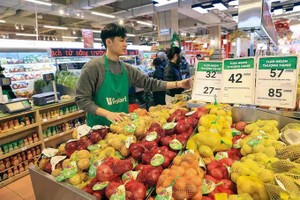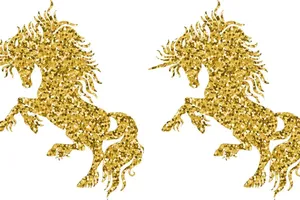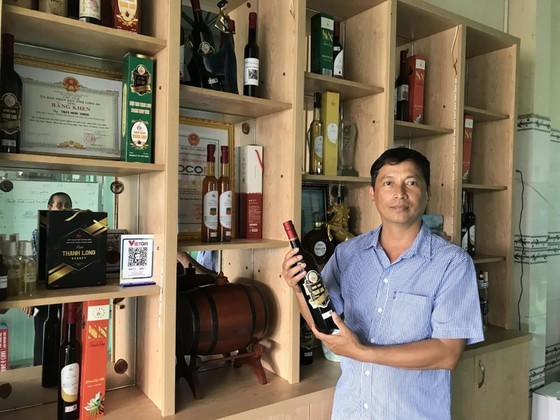 |
Teacher Tran Quoc Trong with his dragon-fruit-based products |
In 2012, eleven years ago, Dr. Vo Mai, who was the Vice President of the Vietnamese Gardening Association overseeing the Southern region, led a team of journalists to Long Thanh Hamlet, Long Tri Commune, Chau Thanh District, Long An Province, to participate in the "opening ceremony" of the dragon fruit wine production facility belonging to Tran Quoc Trong, a chemistry and physics teacher at Tran Phu Secondary School in Tan An City, who was a trailblazer in the field of dragon fruit wine processing.
When it comes to fruit and vegetable exports, dragon fruit has long been the leading product in terms of export value. However, dragon fruit is difficult to store, so farmers suffer losses when consumption demand falls below production levels. There have been numerous instances where rescue efforts were necessary.
As someone who has had the opportunity to visit many countries, Dr. Vo Mai knows that although Malaysia grows dragon fruit as a commodity after Vietnam, with a smaller land area, they have been ahead in processing. That is why, from the time she served as the Deputy Director of the Plant Protection Department to her retirement as the Chairwoman of the Vietnam Fruit Association - Vinafruit (later renamed the Vietnam Fruit and Vegetables Association) and later as the Vice President of the Vietnamese Gardening Association, Dr. Vo Mai has always been concerned and has suggested on multiple occasions that there should be processing stage, starting with dragon fruit wine, to address the issue of overproduction.
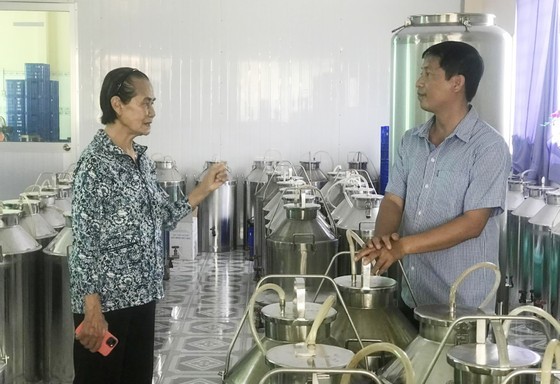 |
Dr. Vo Mai and teacher Tran Quoc Trong |
Teacher Tran Quoc Trong keenly witnessed the volatile pricing of dragon fruit in the market as his family tended to 1,500 dragon fruit plants in Chau Thanh District, a key region for dragon fruit cultivation, yielding over 190,000 tons of dragon fruit annually. There were numerous instances when excess dragon fruit had to be discarded or left by the roadside. It was during a dragon fruit training workshop hosted by the Vietnamese Gardening Association, with Dr. Vo Mai's suggestion, that Tran Quoc Trong conceived the idea of embarking on a dragon fruit-based entrepreneurial endeavor in 2011.
During the initial year, numerous endeavors ended in failure. However, in 2012, Trong sought guidance and technological expertise in wine fermentation from a Vietnamese-French female doctor specializing in wine. This assistance led to eventual success, opening up a new direction for dragon fruit. Now, dragon fruit is processed into various food and beverage products, including dragon fruit juice, dragon fruit powder, and dragon fruit wine.
Recently, upon receiving an invitation from Dr. Vo Mai, who remains deeply dedicated to agricultural matters despite reaching her 80s, I had the privilege of revisiting the winery of teacher Tran Quoc Trong. During the journey, Dr. Vo Mai enlightened me about the Dragon Fruit Wine Production Company (ruouthanhlong.com.vn), the official name of the wine production facility. Here, the scope of processing extends far beyond wine production to encompass a wide array of products made from dragon fruit and various other fruits. Although it remains a small-scale enterprise with a modest workforce, significant transformations have occurred in terms of its area, equipment, technology, and its growing recognition domestically and internationally.
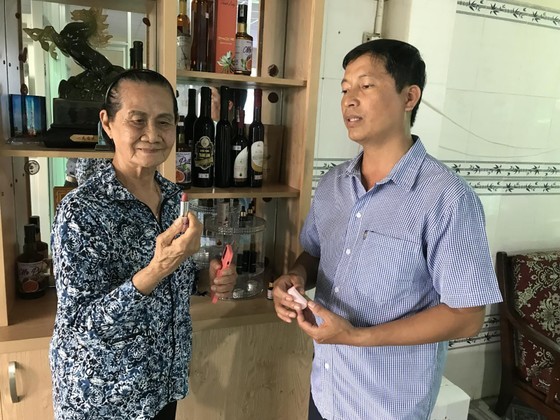 |
Teacher Tran Quoc Trong introduces his new product (lipsticks) to Dr. Vo Mai. |
As stated by Tran Quoc Trong, the winery serves as a destination for numerous groups of local and foreign tourists to learn and explore. It has welcomed more than 40 groups, with the majority from Asian countries, and also including groups from the US and Germany. Additionally, it functions as a venue for internships, practical knowledge enrichment, and the completion of graduation theses for students at the Ho Chi Minh City University of Food Industry, a role it has fulfilled for the past seven years.
Upon forming a sisterhood relationship between Long An Province and Chungcheongnam-do Province in South Korea, this wine production facility has evolved into a destination where Chungcheongnam-do’s delegations visit to offer guidance, recommendations, and assistance regarding equipment, technology, and materials. These efforts aim to enable the company to enhance product quality, shorten fermentation times, diversify its product range, and expand its manufacturing facility.
In 2020, Tran Quoc Trong's project to produce wine from dragon fruit won the top prize in Long An Province's second edition of the "Creative Entrepreneurship Ideas" competition.
According to Trong, the crucial factor determining the quality of wine is absolute adherence to the processing formula, with temperature being the most critical factor. The company has been following the ISO 9001:2015 standard since 2021 and is in the process of adding the HACCP standard.
Back in 2012, the wine production facility exclusively offered dragon fruit wine products. Now, it has expanded its range to include over ten different types of wines made from dragon fruit, cashew apple, mango, pineapple, lime, and cocoa pulp. Among them, dragon fruit wine has been certified as a 3-star provincial OCOP product. On average, the company produces 2,000 liters of various fruit wines per month, including products processed in collaboration with partners using equipment from South Korea.
Furthermore, with the introduction made by Dr. Vo Mai, Tran Quoc Trong had the chance to engage in collaboration with scientists from the Institute of Oil and Oil-bearing Plants Research to explore techniques for extracting oil from dragon fruit seeds.
Over the past two years, with the invaluable support of the Institute of Oil and Oil-bearing Plants Research, the extraction of dragon fruit seed oil has been carried out successfully, catering to medical and cosmetic needs for anti-aging skin care products. More recently, the development of lipsticks and solid perfumes utilizing dragon fruit seed oil has become a reality, thanks to financial backing from the provincial Department of Science and Technology and technology transfer from the Institute of Oil and Oil-bearing Plants Research. These perfume bottles, lipsticks, and skin creams, all derived from dragon fruit seed oil, stand as eco-friendly products that promote human well-being. At present, these items are available in the domestic market and are making their way into the South Korean market.
Trong has mentioned that they are presently conducting trials for organic fertilizer produced from dragon fruit peels, and the outcomes are encouraging. If successful, it would eliminate waste from dragon fruit entirely, as everything from the flesh, seeds, and peels could be transformed into many valuable products.
Recent research has revealed that both the peel and pulp of dragon fruit, especially the red-fleshed variety, contain a multitude of polycyclic compounds with potential applications in high-tech fields like betanin, phyllocactin, and hylocerenin. In particular, dragon fruit peel contains a lot of betacyanin. These color compounds have versatile uses across diverse sectors, including medicine, environmental science, and the food industry.
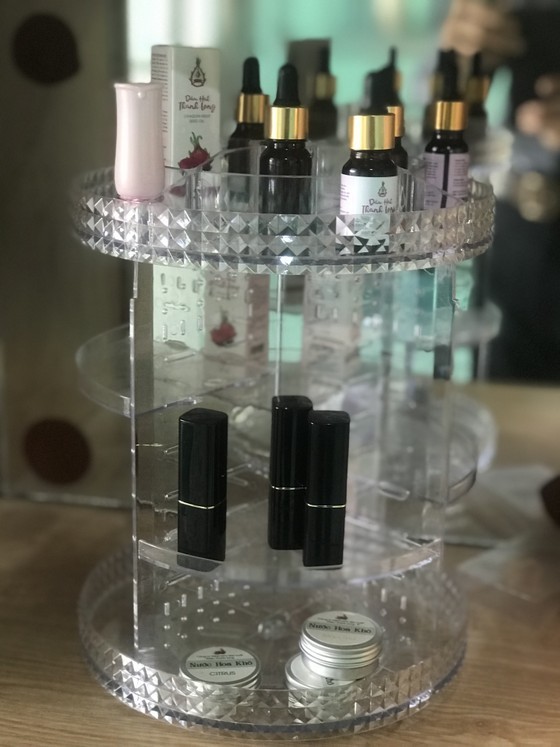 |
Perfume, lipsticks, and skin cream made from dragon fruit oil |
In medicine and food applications, color compounds are utilized as natural colorants with pharmacological effects, including antioxidant properties, the reduction of blood lipids, and warning indicators for liver and kidney weakness. Furthermore, these color compounds are invaluable for quick analysis of heavy metals, pH levels, Helicobacter pylori (HP) presence, and food decomposition.
Hence, in order to elevate the value and improve the economic viability of dragon fruit, Tran Quoc Trong has revealed that a research project entitled "Exploration of Dragon Fruit Color Compounds for the Development of Premium Products in Long An Province," proposed by Dr. Nguyen Thanh Danh of the Institute of Chemistry, Vietnam Academy of Science and Technology is slated for execution as a provincial-level scientific and technological initiative in 2024. This project will last two years, from January 2024 to December 2025. Its primary objective is the efficient extraction of color compounds from dragon fruit and the application in the production of high-quality goods, consequently enhancing product value and orienting applications within the realms of food and environmental sectors. The project will be conducted at the Dragon Fruit Wine Production Company.
It can be affirmed that, inspired by Dr. Vo Mai and driven by the determination of teacher Tran Quoc Trong to turn dragon fruit into wine, new avenues have unfolded. Thereby, they have gradually tapped into the potential and elevated the value, paving the way for a more foundational development of this fruit, ultimately resulting in greater economic benefits for dragon fruit growers.


